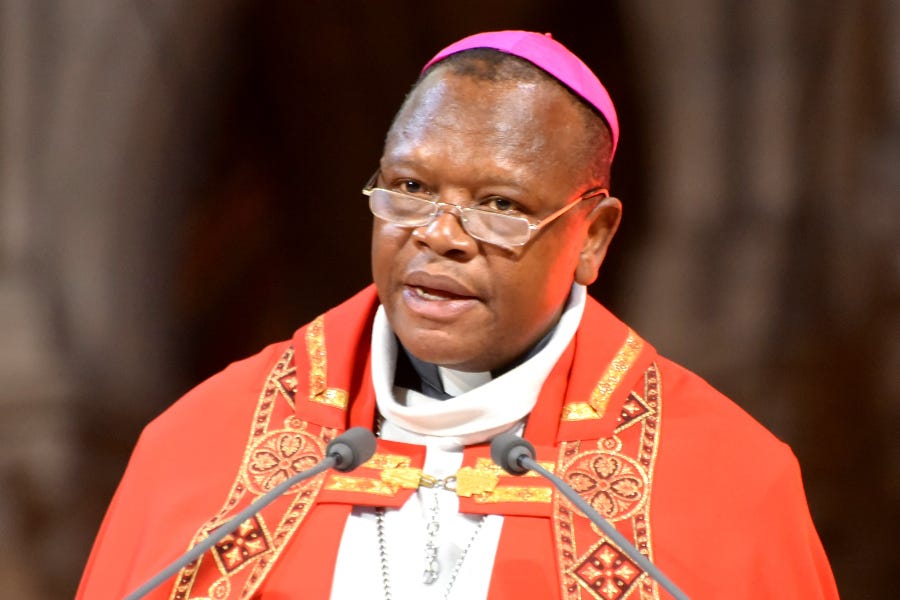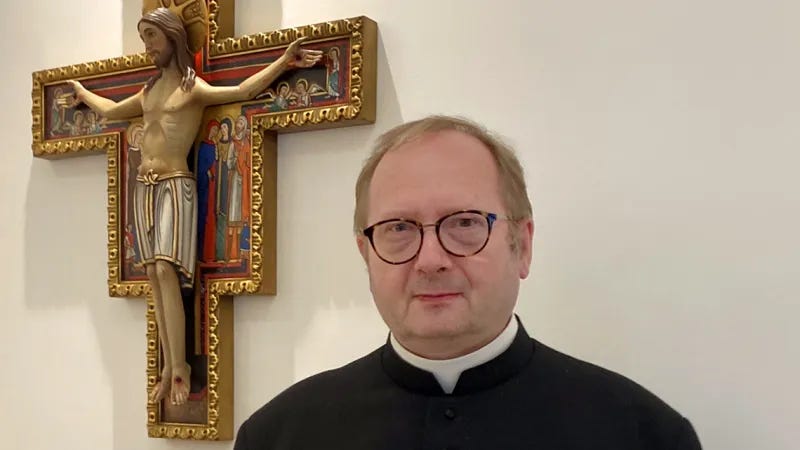The Catholic Church in Switzerland announced plans this week for the creation of a new national “synodality commission.”

An April 10 statement, issued in French, German, and Italian, said that the new body would “test forms of synodal decision-making at the national level” for a five-year trial period.
What exactly is the new commission and what is its remit? And how does it compare with the controversial “synodal committee” in neighboring Germany?
The Pillar takes a look.
What’s the background?
Given the complexity of the Catholic Church in Switzerland, it’s probably best to begin with some background.
Wednesday’s press release was issued jointly by the Swiss bishops’ conference and the Roman Catholic Central Conference of Switzerland (known by its German acronym RKZ).
The Swiss bishops’ conference consists of the country’s diocesan and auxiliary bishops, as well as the abbots of the historic Einsiedeln Abbey and Abbey of Saint Maurice.
The RKZ is a distinctively Swiss body that requires a little more explanation.
Switzerland is a relatively small country, roughly the size of Vermont and New Hampshire combined, with a population of under 9 million. But as its official name — the Swiss Confederation — suggests, it has an intricate structure.
Switzerland is a federal republic with 26 member states, known as cantons. In many cantons, religious communities are required to have a democratic organization if they want to be recognized under public law and collect church taxes.
So in addition to the normal diocesan structure, the Catholic Church in Switzerland also has democratically organized regional bodies known as cantonal churches.
The canton of Lucerne, for example, belongs to the Diocese of Basel, but is also covered by the Roman Catholic Regional Church of the Canton of Lucerne. This body is recognized as a corporation under public law and has its own constitution. It also has a synod with 100 elected members and a synodal council, with nine elected members, serving as an executive branch.
The body has an important financial role, collecting contributions from parishes and ensuring that buoyant communities support struggling ones. It also channels funds for diocesan or nationwide initiatives.
The RKZ is the organization that brings together Switzerland’s 24 Catholic cantonal churches (as well as the dioceses of Lugano and Sitten). It has a 52-member plenary assembly that meets at least three times a year, and offers a powerful counterweight to the Swiss bishops’ conference.
The RKZ and the bishops’ conference together form what Swiss Catholics call the “dual system.”
As Franziska Driessen-Reding, president of the Roman Catholic Corporation of the Canton of Zurich, explained in 2022, in the dual system, “the tasks are quite clearly distributed: lay committees, which exist for the whole of Switzerland, but also at cantonal or parish level, decide, for example, on finances, personnel administration, and property management.”
“The bishop or his vicar general, as well as local pastors and parish leaders, are responsible for pastoral care,” she noted.
What does that mean in practice?
“So if the pastoral leaders of the Zurich Church want to launch a project, for example, to expand palliative care, they have to get the money from us in the regional synod,” Driessen-Reding said.
“Our meetings are open to the public and the decisions can always be viewed, as we are subject to the principle of publicity as a public corporation. The situation is similar at lower levels, such as the parishes.”
While the Catholic Church in Switzerland has been organized for many years in what might be called a synodal style, there is no permanent synodal body covering the whole country.
The attraction of such a body is that it might make the relationship between the two parts of the dual system more harmonious, enabling greater coordination of pastoral and financial matters.
In 1972, the Swiss bishops convened a synod known as “Synode 72,” intended to implement the decisions of Vatican Council II. The synod called for the creation of a permanent nationwide “pastoral council.” But Rome rejected the proposal.
The idea of creating a nationwide synodal body has re-emerged following Pope Francis’ decision to launch a global synod process in 2021.
What exactly is the new commission?
The joint statement of the Swiss bishops’ conference and the RKZ did not offer a comprehensive picture of the new “synodality commission.”
But it said that both organizations had adopted a statute for the new body and guaranteed funding.
The commission will consist of 30 members, appointed by the bishops’ conference and drawn from Switzerland’s different language groups, representing youth and adult organizations, religious orders, and various areas of pastoral care.
They will be supported by an office based at the Swiss Pastoral Sociological Institute in St. Gallen.
The statement said that the Church in Switzerland wanted to create the new body out of a “desire for more participation and community in fulfilling its mission,” as well as “to promote synodality as a Church style for decision-making processes.”
“The spiritual approach is to combine listening to the Holy Spirit with listening to the voice of people,” the statement said. “In a joint process, Church officials and lay believers try to rediscover the meaning of the Gospel of Christ and to make it fruitful for the mission of the Church.”
The statement explained that the commission’s “main task” would be “to shape the synodal process at the national level.”
It will also “follow the universal Church synodal process and make it fruitful for the work in Switzerland.”
It will promote “mutual understanding about the different perspectives of synodality and the different experiences of its implementation” in the diverse parts of the Swiss Church.
It will also be asked to “develop and test suitable formats for synodal consultation and decision-making,” while identifying “priorities for the renewal of the Catholic Church in Switzerland,” as well as “recommendations on possible courses of action for the Swiss bishops’ conference, the RKZ, or other authorities.”
Following the German way?
The mention of “decision-making” is likely to raise eyebrows among Catholics who have followed Germany’s controversial “synodal way.”
From 2020 to 2023, Germany’s bishops and select lay people took part in five synodal way assemblies, approving 150 pages of resolutions calling for radical changes to Catholic teaching and practices.
Among the most contentious was the creation of a “synodal committee” — composed of diocesan bishops and carefully selected lay people — to take up the synodal way’s work, paving the way for the creation of a permanent “advisory and decision-making” body known as the “synodal council.”
The Vatican ruled out the creation of a permanent council with sweeping powers over the Church in Germany, but was ambivalent about the synodal committee, which was inaugurated last November, months after the synodal way formally ended.
Would the creation of a national synodality commission with decision-making powers set the Swiss Church on a similar collision course with Rome?
That would seem to depend on what, precisely, “decision-making” means in this context.
Urs Brosi, the general secretary of the RKZ, told the Swiss Catholic website kath.ch that “without decision-making powers, the new commission also runs the risk of dying of irrelevance.”
The website suggested that one way of ensuring the body’s relevance, while avoiding Vatican intervention, would be for the commission to have no formal decision-making powers. Instead, it would draw up proposals for initiatives that would be jointly financed by the bishops’ conference and the RKZ, which would both have final approval over projects.
Brosi compared this to the Swiss parliament, which consists of a lower house known as the National Council and an upper house called the Council of States.
But it’s currently unclear exactly what the decision-making mechanism would be. The national synodality commission’s statutes do not seem to have been published, so there is a lack of available detail.
The April 10 statement did not say whether the Vatican had approved the proposed commission or how the country’s bishops would exercise their authority within the context of the new body.
Such questions may have been discussed when Vatican Cardinal Mario Grech, the secretary general of the Synod of Bishops, visited Switzerland at the invitation of the country’s bishops in March.
But it’s difficult to determine at this stage how similar or different the Swiss synodality commission will be to the German synodal committee — and whether tensions with Rome are likely.
Taking the initiative
The proposed synodality commission is emerging at a time of acute crisis in Swiss Catholicism.
Last September, it emerged that the Vatican had ordered an investigation into allegations against six bishops — four active and two retired. That same month, an independent pilot study identified 1,002 “situations of sexual abuse” in the Catholic Church in Switzerland since the mid-20th century.
Figures published last November showed that a record number of Catholics formally disaffiliated from the Church in Switzerland in 2022.
Church leaders are under intense pressure to show that they can tackle the crisis. The creation of the new commission may be part of their response, though the crisis wasn’t mentioned in the April 10 statement.
Another factor in the commission’s creation could be the apparent frustration among prominent Swiss Catholics at the pace and direction of the global synodal process.
In March, Swiss synod on synodality participant Helena Jeppesen-Spuhler expressed disappointment at the Vatican’s decision to create 10 new study groups on sensitive topics raised at the first session of the synod on synodality in Rome because the groups’ work will not be completed before the second and final session this October.
“It is important for the Church in Switzerland and in large parts of Europe that bold decisions are made in the fall,” Jeppesen-Spuhler said. “As members of the synod, we need working documents for this.”
This week, she described the proposed Swiss commission as “a necessary step towards a more synodal Church.”
Swiss Catholics may be emulating their German counterparts by not waiting for the results of the global synodal process before launching an experimental new national “synodal” structure.
But the outcome is likely to be shaped by distinctively Swiss concerns and therefore look significantly different to the German model.



